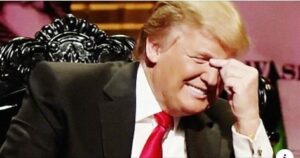
Checkmate.
Attorney Tom Renz, who actually read Trump’s D.O.G.E. Executive Order and expecting some illegal power grab, found it to be airtight. Turns out that President Trump and Musk didn’t create anything; Obama did.
Obama created the United States Digital Service (USDS) in 2014. It was meant as a bureaucratic patch job to fix the Obamacare website meltdown.
Fast forward to 2025. Trump rebranded it DOGE the United States DOGE Service. Keeps the acronym, keeps the funding, but gives it a whole new mission: Find the Receipts
Legally untouchable because it was already fully funded and operational. Trump invokes 5 USC 3161, which allows him to create temporary hiring authorities. DOGE teams are embedded inside every single federal agency. Each team consists of a lawyer, HR rep, a zoomer nerd, and an investigator. They report to DOGE, not the agency they’re embedded in.
The details: (5 U.S.C. § 3161 is a section of the United States Code under Title 5, which governs “Government Organization and Employees.” Specifically, it outlines the rules for the employment and compensation of employees within temporary organizations established by the federal government. Here’s a breakdown of what it is and what it does:
What It Is
5 U.S.C. § 3161 falls under Subchapter IV of Chapter 31, titled “Temporary Organizations Established by Law or Executive Order.” It provides a legal framework for creating and staffing temporary entities—such as commissions, committees, or boards—that are set up for a limited duration to address specific tasks or studies. These organizations are distinct from permanent federal agencies and are designed to dissolve once their purpose is fulfilled.
Key Provisions and What It Does
Definition of a Temporary Organization:
A “temporary organization” is defined as one created by law or Executive Order.
It exists for a specific period, not exceeding three years, unless extended under certain conditions.
Its purpose is to perform a specific study, project, or task, after which it terminates upon completion or when a related condition is met.
Employment Authority:
The head of a temporary organization has the flexibility to appoint employees without adhering to the standard classification and pay rules outlined in Chapter 51 of Title 5 (which applies to most federal employees under the General Schedule system). Appointments can be made based on the skills and numbers needed to fulfill the organization’s mission, offering more agility than typical federal hiring processes. The initial appointment period cannot exceed three years, but it may be extended for up to two additional years under regulations set by the Office of Personnel Management (OPM).
Compensation Rules:
The law allows the head of the temporary organization to set pay rates for employees, with some limits: For executive-level positions (e.g., chairman, executive director), the basic pay cannot exceed the maximum rate established for the Senior Executive Service (SES) under 5 U.S.C. § 5382.
For other staff, pay is determined under OPM regulations but must align with broader federal pay principles. Locality pay (adjustments based on geographic cost of living) can be included, but the law doesn’t grant authority to create new types of compensation beyond what’s already allowed under
Title 5 or other statutes.
Volunteer Services:
Temporary organizations can accept volunteer services, and those volunteers are treated as federal employees for specific purposes, such as: Workers’ compensation for job-related injuries (Chapter 81 of Title 5). Tort claims liability (Chapter 171 of Title 28).
Conflict-of-interest rules (Chapter 11 of Title 18).
Purpose and Flexibility:
The statute’s primary purpose is to give the government a mechanism to quickly assemble a workforce for short-term, mission-specific tasks without the bureaucratic constraints of permanent agencies.
It ensures these organizations can operate efficiently while maintaining oversight through OPM regulations and alignment with existing federal employment laws.
Practical Implications
Examples of Use: This authority might be used to create a commission to study a national issue (e.g., a task force on disaster response or a panel to review a specific policy), established either by Congress via legislation or by the President through an Executive Order.
Limits: While it grants flexibility in hiring and pay, it doesn’t allow these organizations to exercise authority over other federal agencies or go beyond their defined scope (e.g., it’s not a tool for overriding constitutional structures or managing permanent departments).
Termination: Once the task is done, the organization dissolves, ensuring it doesn’t linger as an unnecessary bureaucratic entity.
In summary, 5 U.S.C. § 3161 enables the federal government to establish and staff temporary organizations efficiently for specific, time-limited purposes, with tailored employment and compensation rules. It’s a practical tool for addressing short-term needs without altering the broader framework of federal employment or agency authority.)
But wait, there’s more! Trump invokes 44 USC Chapter 35, which governs federal IT and cyber security oversight. Since USDS was originally an IT oversight body, DOGE now has full access to all federal data systems. Yes, that’s right. All of them.
His executive order is written to block legal challenges. Includes language that overrides conflicting executive orders. Orders every agency to comply. Refusal means they violate presidential authority.
Congress can’t defund it because it’s not a new program, just a repurposed one. DOJ can’t sue for overreach because Trump used existing laws exactly as written.
Democrats trying to file legal challenges run into standing issues because DOGE operates within existing frameworks. Obama literally built the perfect Administrative (read: Deep State) IT backdoor.
Trump and Musk just hacked the system and took the admin controls. Musk now has legal oversight of every major agency’s internal systems. The Administrative State can’t stop it without rewriting multiple federal laws.
They legally outplayed the system, and there’s nothing anyone can do about it.
Obama created DOGE.
Checkmate. –Un-Common Sense